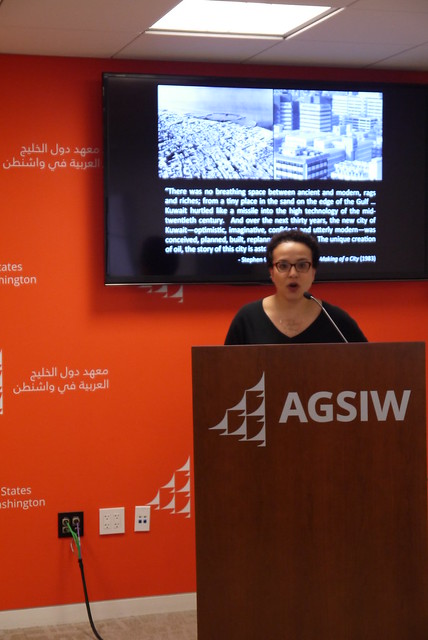The Arab Gulf States Institute in Washington hosted a book launch with Farah Al-Nakib, who presented her new release “Kuwait Transformed: A History of Oil and Urban Life.” Al-Nakib is an assistant professor of history and the director of the Center for Gulf Studies at the American University of Kuwait. AGSIW Visiting Scholar Hala Aldosari moderated.
Part 1:
Part 2:
Al-Nakib began with a brief history of Kuwait City before the discovery of oil, noting that the city was a cosmopolitan place; the spatial proximity of urban spaces made the city diverse, tolerant, and receptive. Before oil, Kuwait City was more akin to a shared public space. After oil, it became a state-owned land. The introduction of citizenship redefined the relationship between the people and the state, and further segregated the population. Both citizenship and modern architecture diminished interaction with non-Kuwaitis, let alone undermining the city’s cosmopolitanism.
The new city built after the 1950s hindered the ability to engage in everyday interactions with different people, curbing social experiences and encounters that were commonplace before oil. Moreover, state housing policies deliberately segregated the population into discrete residential zones. As such, public encounters with different groups have significantly diminished.
While the 1991 Iraqi invasion of Kuwait halted the oil urbanization process, the 2003 U.S. invasion of Iraq triggered a renewed construction frenzy. Glass and steel high rise buildings replaced traditional shared spaces. Luxury hotels and shopping malls replaced public and mixed-use areas. Consequently, Kuwaitis lost their right to the city, namely their right to participate in a vibrant urban life. The privatization of urban space diminished opportunities for citizens and residents to interact and coexist.
Al-Nakib argued that decades of urban planning and suburbanization combined with strict citizenship laws have replaced the openness, tolerance, and mutuality of Kuwait’s pre-oil society with the insularity and xenophobia that characterize social relations today. While Kuwaiti citizens and residents need to negotiate diversity and difference, Al-Nakib warned that present-day Kuwait City does not have spaces where potential hostility can be mediated. The city’s urban life with its commercial shopping malls is the space that breeds rather than mitigates conflict.
Al-Nakib concluded that Kuwait today is witnessing a demand for a restored right to the city by a number of social forces including protesters, small business owners, architects, and civil society activists, among others. They are claiming their right to use the spaces of the city without restrictions and to participate in a vibrant urban life. Collectively, such movements have the potential to counter the urbanizing tendencies of decades of top-down planning and the privatization and commodification of urban life.


